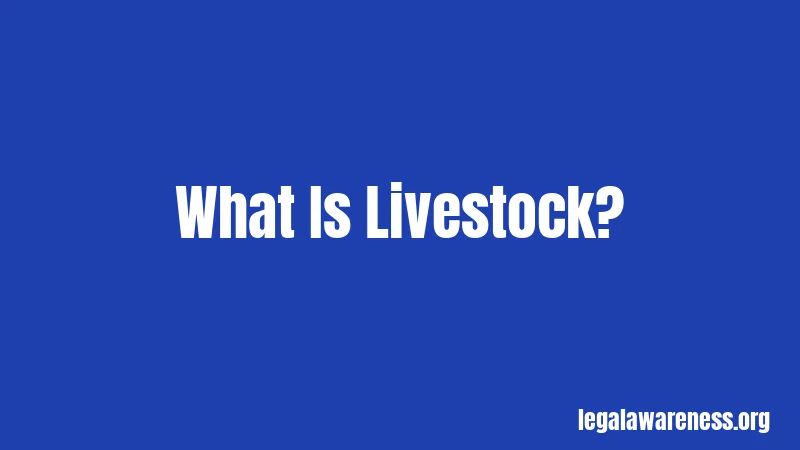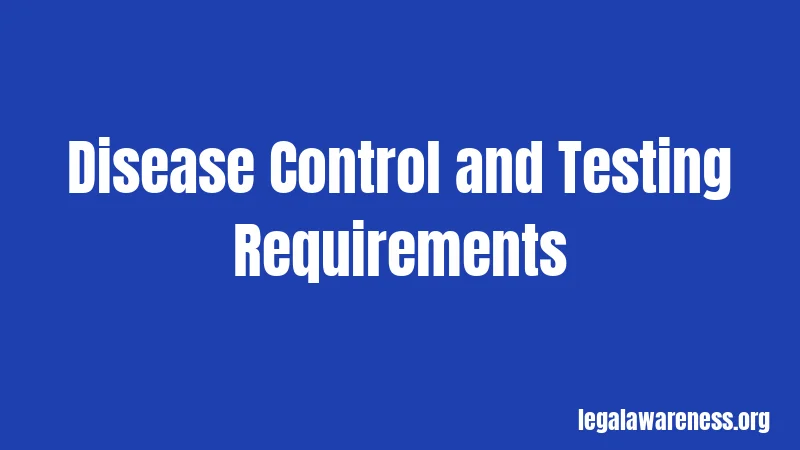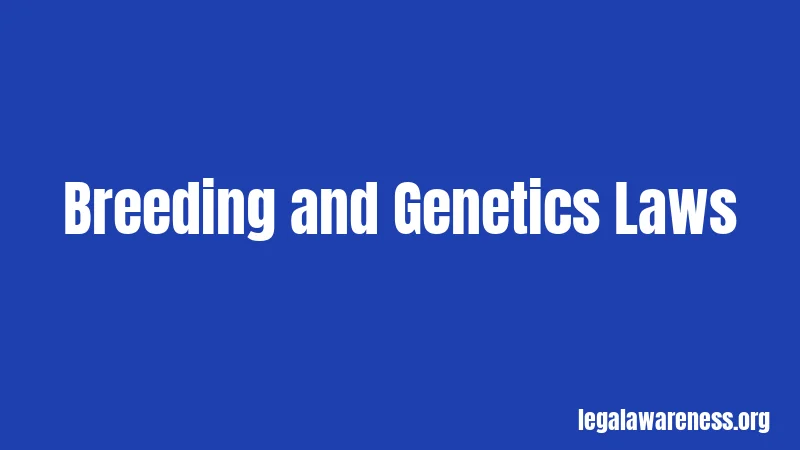Pennsylvania Livestock Laws (2026): Your Complete Legal Guide
You probably don’t think much about livestock laws unless you own animals or live near a farm. But honestly? These rules are surprisingly strict in Pennsylvania. Breaking them can cost you money, damage your reputation, or create serious problems with your neighbors.
Here’s the thing: most people have no idea how detailed these laws are. This guide breaks down everything you need to know in plain English. No confusing legal jargon. Just the facts that actually matter.
What Is Livestock?

Let’s start with the basics. Livestock means farm animals that people raise for food or other purposes. In Pennsylvania, this includes cattle, horses, sheep, goats, pigs, and poultry like chickens or turkeys.
Pretty straightforward, right? But the rules get more complex when you look at specific situations. Let’s dig into the details.
Basic Livestock Ownership Laws
Proper Housing and Care Requirements
Here’s where it gets important. Pennsylvania law requires you to keep livestock in conditions that support their health. The animals need adequate shelter, clean water, and appropriate food. Sounds basic? It is. But the state takes it seriously.
Your livestock needs shelter that protects them from extreme weather. The shelter must be strong enough to keep predators out and animals in. For different animals, the requirements differ slightly, but the goal is always the same: keeping them safe and healthy.
Wondering what counts as “adequate”? The state provides specific guidelines for different animals. Cattle need about 40 square feet of shelter space each. Horses require similar amounts. Smaller animals like goats and sheep need less space, but not by much.
Animal Identification and Movement
Hold on—this part matters. If you move livestock between properties, you need proper documentation. It’s similar to a passport for your animals.
In Pennsylvania, you can’t just haul your cattle to another farm without official records. The state tracks animal movement to prevent disease spread. This is especially important after recent animal health concerns across the country.
When you move livestock, you need an official document. It’s called an “animal movement record” or “transport certificate.” Your veterinarian or the state agriculture office can help you get one. It’s not complicated, but it’s required.
Not sure if you need this for your situation? Here’s the quick answer: if your animals leave your property for any reason, you probably need documentation. Better safe than sorry on this one.
Keeping Livestock in Residential Areas
Okay, pause. This one confuses people often. Can you keep chickens in your backyard in Pennsylvania? Can you have goats in a suburban neighborhood?
The answer isn’t the same everywhere. Pennsylvania gives local governments power to set their own rules. Your township or city might allow small animals. They might ban them completely. You need to check your local ordinances first.
Many townships allow a few chickens. Some allow goats or rabbits. Others say no livestock at all. There’s no statewide rule—it depends entirely on where you live.
The best move? Contact your local zoning office or township office. Ask what animals you’re allowed to keep. Don’t assume the rules are the same as the next town over. They’re not.
Disease Control and Testing Requirements

Mandatory Health Testing
Here’s where it gets more serious. Pennsylvania has strict rules about animal health. The state wants to prevent diseases from spreading between animals.
Many livestock need health certificates before they can enter Pennsylvania. If you’re bringing animals from another state, expect testing requirements. Your veterinarian can handle this, but it takes time and costs money.
Some animals require tuberculosis testing. Others need brucellosis tests. It depends on the type of animal and where it’s coming from. The state agriculture department publishes specific requirements, and they update them regularly.
Already own livestock? You still need to stay alert. If your animals show signs of serious illness, you need to report it. Diseases can spread fast in animal populations. The state takes prevention seriously.
Reportable Diseases
Let me explain this clearly. Certain animal diseases must be reported to authorities immediately. These are called “reportable diseases,” and they include things like rabies, anthrax, and tuberculosis.
If you think your animal has one of these diseases, call your veterinarian right away. They’re required to report it to the state agriculture department. Don’t wait or try to handle it privately. This protects all animals in your region.
What counts as reportable? The state agriculture department keeps an updated list. The list includes about 30 different diseases. Some are rare. Some are more common. All of them are serious.
Vaccinations
This one’s pretty straightforward. Your livestock might need certain vaccinations. Rabies vaccination is often required, especially for animals that might contact humans.
Vaccinations vary by animal type and your specific situation. Talk to your veterinarian about what your animals need. Pennsylvania doesn’t mandate every possible vaccination, but your vet can recommend what makes sense for your herd.
Pasture and Grazing Rules
Water Quality Standards
Your animals need clean water. Pennsylvania law takes this seriously. Livestock can’t drink from contaminated sources.
If you use a pond or stream, you need to make sure it’s safe. Bacteria, chemicals, and pollution can harm your animals. You’re responsible for monitoring water quality on your property.
What’s “safe” water? It varies depending on the animal. Generally, water should be free of harmful bacteria and chemicals. If you’re unsure, get your water tested. Local extension offices can help you find testing services.
Pasture Management
Sound complicated? It’s actually manageable. Your pasture needs to be well-maintained. Overgrazed or muddy pastures cause health problems for animals.
Rotate your animals between different pasture areas when possible. This prevents overgrazing and reduces disease risk. It also lets grass recover. Your land stays healthier longer.
Many farmers divide their pastures into sections. They move animals regularly. This simple practice improves everything—animal health, grass quality, and disease prevention.
Breeding and Genetics Laws

Breeding Restrictions
Some animal breeds face restrictions in Pennsylvania. For example, certain dog breeds have rules around breeding. This is less common with livestock, but it happens.
Check with the Pennsylvania Department of Agriculture if you plan to breed animals for sale. They might have specific requirements for certain breeds. Registration might be required. Health testing might be mandatory.
You’re not limited to certain breeds—that’s not how it works. But if you’re breeding animals commercially or for resale, expect more regulations.
Manure and Waste Management
Proper Storage and Use
Here’s something people often overlook. Livestock manure has to be managed properly. It can’t just pile up anywhere on your property.
Pennsylvania environmental law regulates manure storage. Why? Because manure can contaminate groundwater and nearby streams. This affects your neighbors and the entire environment.
If you have more than a few animals, you likely need a proper manure management plan. This might involve a concrete storage pad. It might involve regular composting. The exact requirements depend on your situation.
Small operations sometimes get exemptions. But if you’re seriously raising livestock, budget for proper manure management. Your neighbors will thank you, and the state will stay satisfied.
Neighbor Impacts
This one matters more than most people realize. Your livestock operation can’t create a public nuisance. That means excessive odors, noise, or pest problems.
What counts as a nuisance? That’s actually decided case-by-case. One neighbor’s acceptable farm smell might be another neighbor’s problem. The general rule: be a good neighbor and keep operations reasonably clean.
Honestly, this is the part most people miss. Even if you follow every state rule perfectly, a bad relationship with neighbors can cause big problems. Keep your property clean. Minimize smells. Control flies and pests. Everyone benefits.
Transporting Livestock
Vehicle and Equipment Standards
Hold on, this part is important. If you transport animals, your vehicle needs to meet certain standards.
The truck or trailer needs proper ventilation. It must protect animals from injury during transport. Animals can’t be crammed too tightly. They need room to breathe and stand.
Temperature control matters too. In hot weather, you need shade or cooling. In cold weather, protection from extreme cold. Animals can die from transport conditions gone wrong.
Distance and Rest Rules
Pennsylvania has rules about how long animals can be transported without rest. For most livestock, extended transport requires breaks. Animals need water and rest stops, especially on long hauls.
The exact rules vary by animal type and distance. For cattle, the general rule is not more than 28 hours without food and water. Horses have similar requirements. Poultry has different rules.
You’re not expected to stop every hour. But for journeys over several hours, plan breaks. Your animals’ health depends on it.
Penalties and Consequences
What Happens If You Violate These Laws
Okay, here’s where it gets real. Breaking Pennsylvania livestock laws has real consequences.
Minor violations might result in warnings or fines. First-time violations for things like improper housing might cost $100 to $300. If you don’t fix the problem, the fines increase.
More serious violations carry bigger penalties. Severe animal cruelty or neglect can result in fines up to $1,000 or more. You could face criminal charges. You might spend time in jail.
This isn’t meant to scare you—just to be clear about consequences. Most people who follow basic rules have no problems.
License Suspension
In some cases, you could lose your ability to own or transport animals. If you’re caught transporting animals in unsafe conditions repeatedly, authorities might suspend your transport privileges.
Serious animal cruelty convictions can result in permanent bans from animal ownership. These are rare, but they happen. Don’t take this lightly.
Civil Liability
Beyond criminal penalties, your neighbors can sue you. If your livestock damages their property, they can take legal action. If odor or pests from your farm affect their health, they might have a case.
This is where good neighbor relationships matter most. Prevention is way easier than legal battles.
Special Circumstances
Dairy Operations
Dairy farms face stricter regulations than most livestock operations. You need regular herd health testing. Milk needs to be handled under specific sanitary conditions.
If you’re selling milk or dairy products, expect more inspections. Equipment standards are higher. Record-keeping requirements are extensive. But if you follow the rules, you’re protected and trustworthy.
Hobby Farms and Homesteads
Personally, I think the state is more reasonable with small operations. If you have a few animals for personal use, requirements are lighter. But “light” doesn’t mean “none.”
Even hobby farms need proper animal care. They need reasonable waste management. They need to prevent nuisances. The rules just aren’t as detailed as for large commercial operations.
Poultry Operations
Poultry has some unique rules. Backyard chickens are increasingly allowed in Pennsylvania communities. But requirements vary wildly by location.
Some towns allow up to 10 chickens with no permit. Others ban poultry entirely. Some require permits and specific coop standards. Again, check your local rules first.
Equine (Horse) Operations
Horse owners need to follow animal care standards like everyone else. Horses need shelter, food, water, and veterinary care. Pastures need adequate fencing.
If you’re operating a boarding facility or riding stable, expect more regulations. You might need business licenses. Your facility might need inspections. Liability insurance becomes important.
How to Stay Compliant with Pennsylvania Livestock Laws
Step 1: Know Your Local Rules
Start here. Check with your township office, city zoning department, or county extension office. Ask what animals you’re allowed to keep. Ask about setback distances from neighbors’ homes.
Trust me, this works. Fifteen minutes of phone calls saves you months of problems later.
Step 2: Get Veterinary Guidance
Find a good large-animal veterinarian. Seriously, this matters. Your vet knows Pennsylvania rules. They can tell you what health testing your animals need. They can set up vaccination schedules.
Most veterinarians love working with people who want to do things right. They’ll guide you through requirements.
Step 3: Document Everything
Keep records of animal health. Keep vaccination records. Keep records of any treatments. Keep feed receipts. Keep veterinary visit notes.
Why? Because if problems ever arise, documentation protects you. It shows you’re trying to comply. It shows you care about your animals.
Step 4: Plan Your Facilities
Before you get animals, plan your facilities. Where will they sleep? Where will you store manure? Where will water come from? Is there adequate drainage?
Good planning prevents most problems. Bad planning creates headaches.
Step 5: Be a Good Neighbor
This sounds simple, but it matters enormously. Keep your property clean. Manage odors and pests. Don’t let animals wander onto neighbors’ land. Communicate if problems arise.
Honestly, being a good neighbor is your best legal protection. Neighbors who like you don’t call the authorities. They work with you to solve problems.
Frequently Asked Questions
Can I keep chickens in my suburban neighborhood? Depends on where you live. Many Pennsylvania towns now allow small numbers of backyard chickens. Check your local zoning rules before getting birds.
Do I need a veterinarian’s permission to keep livestock? No permission needed, but getting veterinary guidance is smart. Your vet helps ensure your animals stay healthy and meet legal requirements.
What should I do if my neighbor complains about my livestock? Take it seriously. Talk to them. See if you can solve the problem. If you can’t, consult a lawyer or your local agriculture extension office for advice.
Are there any animals I absolutely cannot keep in Pennsylvania? Most livestock are legal statewide, but local bans vary. Large animals like cattle might be banned in residential areas. Exotic animals often face restrictions. Check with your township first.
Do I need insurance for my livestock operation? Not required by state law, but absolutely recommended. Liability insurance protects you if someone gets hurt or property gets damaged. Animal mortality insurance protects your investment.
How often does the state inspect livestock operations? Frequency varies. Commercial operations get regular inspections. Hobby farms get inspected if complaints arise. Dairy operations get frequent testing requirements.
What counts as animal cruelty under Pennsylvania law? Failing to provide food, water, shelter, or veterinary care. Causing unnecessary pain. Ignoring serious health problems. Transporting animals in inhumane conditions. The list goes on, but the main idea is clear: animals deserve care.
Can I move my animals to another state? Yes, but you need proper documentation. Health certificates are usually required. Vaccination records must be current. Your veterinarian handles the paperwork.
Important Resources and Contacts
Pennsylvania Department of Agriculture
Website: www.agriculture.pa.gov Phone: 717-772-2853 This is your official source for livestock regulations and guidelines.
Penn State Extension
Website: extension.psu.edu Contact: Your local Penn State Extension office Free resources and guidance on livestock care and management.
Your County Extension Office
Local expertise for your specific area. They know your community’s rules and can answer specific questions.
Your Local Zoning/Township Office
Before getting livestock, talk to these officials. They tell you what’s allowed where you live.
American Veterinary Medical Association
Website: www.avma.org Find veterinarians who specialize in livestock in your area.
Final Thoughts
Pennsylvania’s livestock laws aren’t meant to stop you from raising animals. They’re meant to protect animal welfare, public health, and neighbors’ rights.
If you follow the basics—proper care, appropriate housing, good record-keeping, and good neighbor relations—you’ll be fine. Most people who have problems are the ones ignoring obvious red flags.
The key to success? Do your homework first. Know your local rules. Find a good veterinarian. Plan properly. Be reasonable with your neighbors.
Now you know the basics. Stay informed, stay compliant, and when in doubt, reach out to your local extension office or agriculture department. They’re there to help, not catch you breaking rules.
You’ve got this. Good luck with your livestock operation!
References
- Pennsylvania Department of Agriculture – Livestock & Animals https://www.agriculture.pa.gov/Business/Pages/default.aspx
- Pennsylvania Consolidated Statutes Title 3 (Agriculture) https://www.legis.state.pa.us/WU01/LI/LI/US/HTM/03/00000100.HTM
- Penn State College of Agricultural Sciences Extension https://extension.psu.edu/livestock-and-poultry
- Pennsylvania Animal Care & Adoption Act https://www.legis.state.pa.us/WU01/LI/LI/US/HTM/23/00005300.HTM
- USDA APHIS – Pennsylvania Livestock Regulations https://www.aphis.usda.gov/
- Pennsylvania Board of Veterinary Medicine https://www.dos.pa.gov/BusinessEducation/Occupational/Pages/Veterinary-Medicine.aspx
